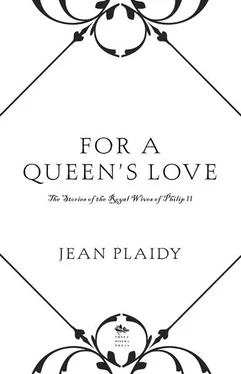Jean Plaidy - For a Queen's Love - The Stories of the Royal Wives of Philip II
Здесь есть возможность читать онлайн «Jean Plaidy - For a Queen's Love - The Stories of the Royal Wives of Philip II» весь текст электронной книги совершенно бесплатно (целиком полную версию без сокращений). В некоторых случаях можно слушать аудио, скачать через торрент в формате fb2 и присутствует краткое содержание. Жанр: Старинная литература, на русском языке. Описание произведения, (предисловие) а так же отзывы посетителей доступны на портале библиотеки ЛибКат.
- Название:For a Queen's Love: The Stories of the Royal Wives of Philip II
- Автор:
- Жанр:
- Год:неизвестен
- ISBN:нет данных
- Рейтинг книги:5 / 5. Голосов: 1
-
Избранное:Добавить в избранное
- Отзывы:
-
Ваша оценка:
- 100
- 1
- 2
- 3
- 4
- 5
For a Queen's Love: The Stories of the Royal Wives of Philip II: краткое содержание, описание и аннотация
Предлагаем к чтению аннотацию, описание, краткое содержание или предисловие (зависит от того, что написал сам автор книги «For a Queen's Love: The Stories of the Royal Wives of Philip II»). Если вы не нашли необходимую информацию о книге — напишите в комментариях, мы постараемся отыскать её.
For a Queen's Love: The Stories of the Royal Wives of Philip II — читать онлайн бесплатно полную книгу (весь текст) целиком
Ниже представлен текст книги, разбитый по страницам. Система сохранения места последней прочитанной страницы, позволяет с удобством читать онлайн бесплатно книгу «For a Queen's Love: The Stories of the Royal Wives of Philip II», без необходимости каждый раз заново искать на чём Вы остановились. Поставьте закладку, и сможете в любой момент перейти на страницу, на которой закончили чтение.
Интервал:
Закладка:
She thought: If I had been a heretic, he would have carried the wood; he would have lighted it at my feet.
Always about him was an aura of horror. She could never think of that Philip who had been kind to her without seeing his other self, the gloomy fanatic, the man who had sought to bring Jeanne to the stake, the man who had taken his sword in his hand and sworn to serve the cruel Inquisition, who had sat tense and exultant while the bodies of men and women were burned in the flames, and the screams of martyrs rose to Heaven. Carlos was indeed between them, for she could never see her husband but as the man who had murdered his own son.
Yet she was sorry for him, this strange, frustrated man.
Now that her end was near she wanted to say to him: “Philip, you are failing to realize your dreams and the failure comes from yourself. Show kindness and tolerance to the Flemings and you will beat Orange yet.”
Kindness! Tolerance! But he had determined to set up the Inquisition all over the world; he believed the Inquisition to be an instrument of God. There was no kindness and tolerance there.
“Philip, Philip!” she wanted to cry. “How mistaken you are! You did not dream impossible dreams. You might have won the world and I might have loved you as you wished to be loved. With kindness and toleration the world could have been happy under your domination. I might have loved the man you could have been. But you do not understand, and the failure to make your dreams realities is due to yourself.”
But how could she say such things? And how could he ever understand them?
Her daughter was born to live but a few hours.
Philip sat by her bed. He knew that she was slipping away from him.
“Isabella!” he cried. “Come back to me. We will be happy yet.”
She smiled sadly. “It is too late, Philip,” she whispered. “Oh, do not grieve for me. You see me well on the way out of this unhappy world into a better one.”
“Isabella … Isabella … there is so much I have to tell you … so much I have to say. Life for us will be better yet.”
But he knew that he had lost her; and it seemed to him that he heard the mocking laughter of the son whom he had murdered.
an excerpt from
A
FAVORITE
OF THE
QUEEN

1
I t was hot, even for August; the foul odors from the river, carrying the threat of pestilence, hung in the sullen air that sultry day; but the crowds who were assembling on Tower Hill were oblivious of discomfort. Traders had left their shops or stalls in Candlewick Street, East Chepe, and the Poultry; horse-dealers were coming from Smithfield Square; the goldsmiths from Lombard Street, the mercers of Chepeside had deserted their houses, realizing that there could be little business at such a time. Apprentices, risking a whipping, crept out after their masters, determined to see what could be seen on Tower Hill that day.
Laughing and jesting they came. All men and women believed that the hardships of Henry VII’s reign were behind them and the days of plenty were at hand. No more cruel taxes would be wrung from them; no more fines; no more impositions. The old miser King was dead and in his place was a bonny golden boy who laughed loudly, who jested and made sport, and loved to show himself to the citizens of London.
It was he who had provided this day’s pleasure for them; and it clearly indicated what they might expect of him.
“God bless King Hal!’ they cried. “See how he pleases his people! He is the one for us.”
The cheers for the King mingled with the jeers for the traitors. Some apprentices had made two effigies which they held high above the crowd, to be mocked and pelted with refuse.
“Death to them! Death to the extortioners! Death to the misers, and long life to King Harry!”
Jostling, cursing, laughing, they surged about the hill. At the summit, close to the scaffold, members of the nobility were gathered. The bell of St. Peter ad Vincula had begun to toll.
At the edge of the crowd, not venturing into it, stood a boy. He was pale, soberly dressed, and was staring, mournful and bewildered, at the weather-washed walls of the great fortress which seemed to stand on guard like a stone giant. So grim, so cruel did it seem to the boy, that he turned his gaze from it to the green banks where the starry loosestrife flowers were blooming. He remembered a day—long ago it seemed to him now—when he had taken his little brother to the river’s edge to pick flowers. He remembered how they had strolled along, arms full of blossoms. The flower of the water betony was like the helmet a soldier would wear, and he was reminded that soldiers would soon be coming out of the great prison, and with them would be the men who were to die on Tower Hill that day.
“Death to the traitors!” shouted a man near him. “Death to the tax-gatherers! Death to Dudley and Empson!”
The little boy felt the blood rush to his face, for his name was John Dudley, and his father was one of those who would shortly lay their heads upon the block.
He would not look, this little John. He dared not. Why had he come? He knew not. Was it because he had hoped to see a miracle? His father had seemed to him the cleverest man in England; and not only did he seem so to John, but to others, for Edmund Dudley, a humble lawyer, had become chief adviser to the King. But kings die, and often favors die with them; and a friend to one king may be a traitor to another; and if that king is desirous of winning his people’s love, and those people demand a man’s head as a symbol of his love—then that head is given.
He was standing up there now, the father of the boy. Little John stared at the ground, but he knew what was happening, for he heard the shouts of the people. Then there was silence. He looked up at the sky; he looked at the river; but he dared not look at the scaffold.
His father was speaking. The well-remembered voice rose and fell, but the boy did not hear what he said.
Then all was silent again until there came a shuddering gasp from the crowd. John now knew that he was fatherless.
He stood, helpless and bewildered, not knowing whether to turn shuddering away or to run forward and look with the crowd at his father’s blood.
Now the executioner would be holding up his father’s head, for he heard the cry: “Here is the head of a traitor!”
He wondered why he did not cry. He felt that he never would cry again. The shouting people, the gray fortress, the sullen river—they seemed so indifferent to the plight of one more orphan.
Such a short while ago he had been John Dudley, eldest son of a king’s favorite minister, with a brilliant future before him. Now he was John Dudley—orphan, penniless—the son of a man whom the King had called a traitor.
He felt a hand on his shoulder. “John,” said a voice, “you should not be here.”
Turning, he saw standing beside him a man whom he knew well, a man whom he had looked upon in the light of an uncle, one of his father’s great friends in the days of his prosperity—Sir Richard Guildford.
“I … wished to come,” said John haltingly.
“I guessed it,” said Sir Richard. “’Twas a brave thing to do, John.” He looked at the boy quizzically. “And not to shed a tear!”
He slipped his arm through that of the boy and began to lead him away.
“It is better for you not to be here, John,” he said. “What would they do to me?” asked the boy.
“What would they do if they knew I was his son?”
Читать дальшеИнтервал:
Закладка:
Похожие книги на «For a Queen's Love: The Stories of the Royal Wives of Philip II»
Представляем Вашему вниманию похожие книги на «For a Queen's Love: The Stories of the Royal Wives of Philip II» списком для выбора. Мы отобрали схожую по названию и смыслу литературу в надежде предоставить читателям больше вариантов отыскать новые, интересные, ещё непрочитанные произведения.
Обсуждение, отзывы о книге «For a Queen's Love: The Stories of the Royal Wives of Philip II» и просто собственные мнения читателей. Оставьте ваши комментарии, напишите, что Вы думаете о произведении, его смысле или главных героях. Укажите что конкретно понравилось, а что нет, и почему Вы так считаете.












